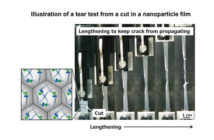Silica producer Evonik has formed a strategic cooperation with the Pörner Group and Phichit Bio Power to supply sustainable Ultrasil precipitated silica to several tire manufacturers.
Using green energy sources for production processes, Ultrasil is manufactured from a raw material called sodium silicate, taken from rice husk ash (RHA) – a by-product of the agricultural sector. Silica aids in reducing fuel consumption by up to 8% compared to passenger car tires which don’t feature the material.
The recent collaboration aims to enable the use of renewable raw materials, leading to more sustainable tire production within the industry. Pörner will leverage its own process to produce silicate from RHA which uses biomass energy. This will enable Evonik to provide a 30% CO2 footprint reduction compared to the company’s standard silica.
Under the partnership Phichit Bio Power, which owns rice mills and biomass power plants, will licence Pörner’s technology and invest in a new RHA sodium silicate plant in Thailand. As a result, Evonik will be able to scale-up a consistent supply of biobased sodium silicate to meet the tire sectors’ international demand for more sustainably produced silica.
“This cooperation is a strategically important first step in the further development of our product portfolio,” said Emmanuel Auer, head of silica business line, Evonik. “For the first time, we can offer our customers an Ultrasil silica with an improved sustainability profile, thus we can support our customers’ carbon reduction and circularity goals. “Further measures at other sites in our global production network are also planned to expand our renewables offering to meet global demand more sustainably.”
“At our demonstration plant in Germany we have verified the superior quality of the bio-silicates over several years of research and development in a pre-qualification process with Evonik,” said Gerhard Bacher, CEO, Pörner Germany.
“Our patented process is based on the ash of biomass power plants fired with rice husks, where the Pörner Bio-Silicate Technology intelligently uses the natural properties of the rice plant to produce high-quality sodium silicates for many applications – above all to produce the silica used in the tire industry. Now, through this cooperation, it is possible to produce Bio-Silicates on an industrial scale and significantly reduce the CO2 footprint compared to the conventional processes. We are starting to decarbonize the silicate processing industry worldwide.”




